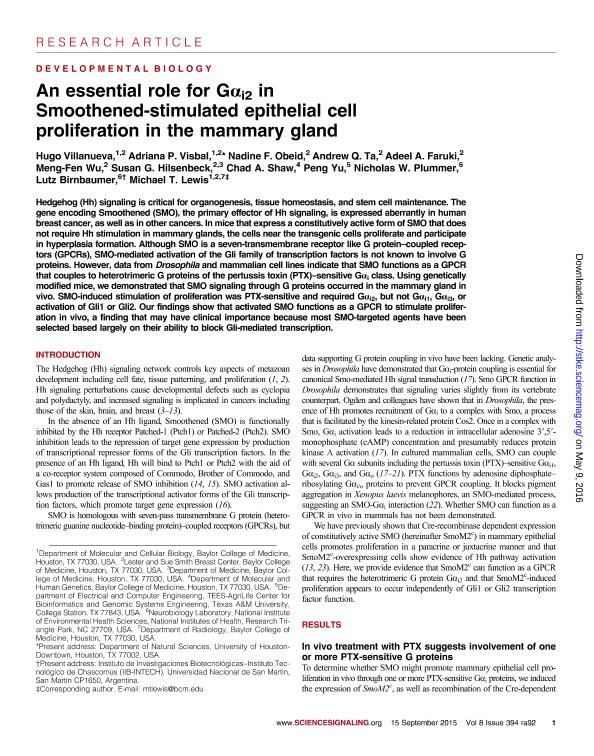Artículo
An essential role for Gα i2 in Smoothened-stimulated epithelial cell proliferation in the mammary gland
Villanueva, Hugo; Visbal, Adriana P.; Obeid, Nadine F.; Ta, Andrew Q.; Faruki, Adeel A.; Wu, Meng Fen; Hilsenbeck, Susan G.; Shaw, Chad A.; Yu, Peng; Plummer, Nicholas W.; Birnbaumer, Lutz ; Lewis, Michael T.
; Lewis, Michael T.
 ; Lewis, Michael T.
; Lewis, Michael T.
Fecha de publicación:
09/2015
Editorial:
American Association for the Advancement of Science
Revista:
Science Signaling
ISSN:
1937-9145
Idioma:
Inglés
Tipo de recurso:
Artículo publicado
Clasificación temática:
Resumen
Hedgehog (Hh) signaling is critical for organogenesis, tissue homeostasis, and stem cell maintenance. The gene encoding Smoothened (SMO), the primary effector of Hh signaling, is expressed aberrantly in human breast cancer, as well as in other cancers. In mice that express a constitutively active form of SMO that does not require Hh stimulation in mammary glands, the cells near the transgenic cells proliferate and participate in hyperplasia formation. Although SMO is a seven-transmembrane receptor like G protein–coupled receptors (GPCRs), SMO-mediated activation of the Gli family of transcription factors is not known to involve G proteins. However, data from Drosophila and mammalian cell lines indicate that SMO functions as a GPCR that couples to heterotrimeric G proteins of the pertussis toxin (PTX)–sensitive Gαi class. Using genetically modified mice, we demonstrated that SMO signaling through G proteins occurred in the mammary gland in vivo. SMO-induced stimulation of proliferation was PTX-sensitive and required Gαi2, but not Gαi1, Gαi3, or activation of Gli1 or Gli2. Our findings show that activated SMO functions as a GPCR to stimulate proliferation in vivo, a finding that may have clinical importance because most SMO-targeted agents have been selected based largely on their ability to block Gli-mediated transcription.
Archivos asociados
Licencia
Identificadores
Colecciones
Articulos(IIB-INTECH)
Articulos de INST.DE INVEST.BIOTECNOLOGICAS - INSTITUTO TECNOLOGICO CHASCOMUS
Articulos de INST.DE INVEST.BIOTECNOLOGICAS - INSTITUTO TECNOLOGICO CHASCOMUS
Citación
Villanueva, Hugo; Visbal, Adriana P.; Obeid, Nadine F.; Ta, Andrew Q.; Faruki, Adeel A.; et al.; An essential role for Gα i2 in Smoothened-stimulated epithelial cell proliferation in the mammary gland; American Association for the Advancement of Science; Science Signaling; 8; 394; 9-2015; 1-11; ra92
Compartir
Altmétricas



